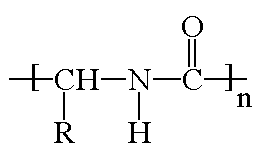Polymers from Whales
There are many mammals on
this earth and many come from our oceans. Whales, walruses, seals,
manatees, and dolphins are just a few examples. Many of these creatures
faced extinction at some point in their
history, especially the baleen whales. This
was because of the natural polymers that
they contained.
 Here is a picture of a right whale, also called a baleen whale.
Here is a picture of a right whale, also called a baleen whale.
Nope, don't see any polymers here.
Well, if you look closely at his mouth, you can see that he is
smiling. This, of course, is the polymer we are looking for! His teeth
are made from baleen. Baleen is a strong, durable, flexible type of
material made of keratin. Keratin can be found in two forms, hard and
soft. Soft keratin is found in whalebone. Hard keratin is the same
substance that is found in human nails and hair, and animal claws, horns
and hoofs. Keratin is a type of protein.
Protein looks like this:

That's okay, I don't see the resemblance either.
Protein is, of course, a natural polymer. Mother nature has been making this polymer for a very long time and it is a very common polymer. It can be found in all living things, not just aquatic mammals. We have lots and lots of protein in us also!
 Our history shows that the different types of protein were used
in things such as skirt hoops, carriage springs, umbrella ribs,
fishing rods, and the laces in corsets.
That should help you understand how durable this natural polymer is.
Our history shows that the different types of protein were used
in things such as skirt hoops, carriage springs, umbrella ribs,
fishing rods, and the laces in corsets.
That should help you understand how durable this natural polymer is.Another natural polymer found in whales is leather. Leather is the skin of many mammals including seals, sharks, dolphins, and walruses.
 Animal skins are made of a polymer called collagen, which is a type
of protein.
The animal skin can be made into leather by tanning. Tanning is a process
in which the skin is crosslinked,
making things like purses stronger and more able to store the 50 pounds of
stuff that is needed by the whole family.
Animal skins are made of a polymer called collagen, which is a type
of protein.
The animal skin can be made into leather by tanning. Tanning is a process
in which the skin is crosslinked,
making things like purses stronger and more able to store the 50 pounds of
stuff that is needed by the whole family.But wait! Some of the chemicals found in whales are not necessarily polymers. In fact, whales were hunted for years not for their polymeric materials, but for their meat and oil. Can you say "spermiciti oil?"
The oil from Sperm whales is made up of spermiceti and fatty acids like Eicosapentaenoic acid. They are also found in walruses, turtles and sharks. These oils are some of the purest found in nature, which is why they were so valuable way back when. They were used as fuel for lamps and as bases for paints and cosmetics. Since then, though, we've figured out how to make these oils, and others like them, from coal and oil based raw materials. Nowadays, there's no need to hunt whales for their polymers and other ingredients although some countries still do, sadly.
Return to the Mammal Show
Return to the Polyquarium